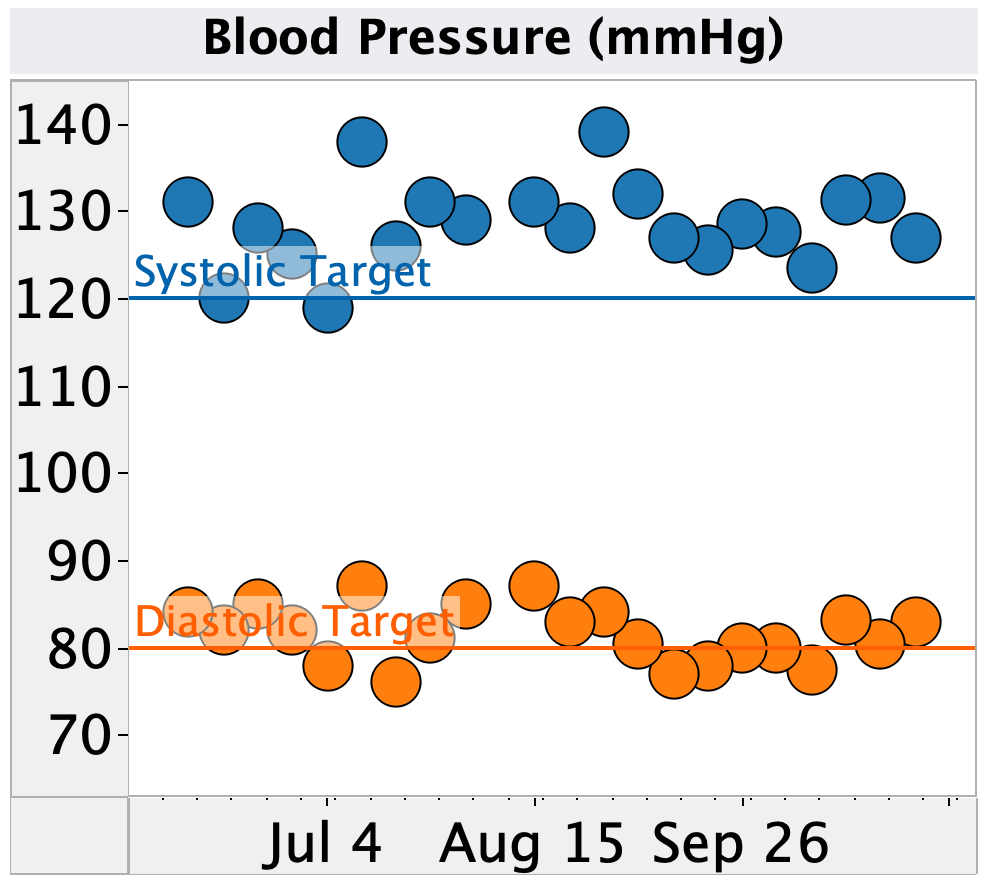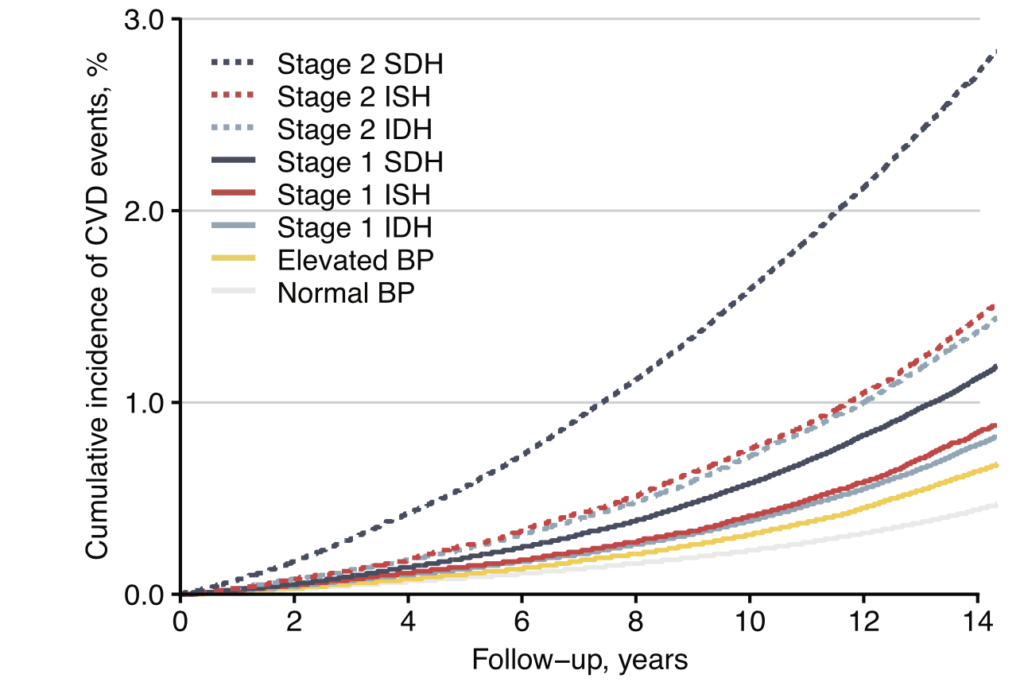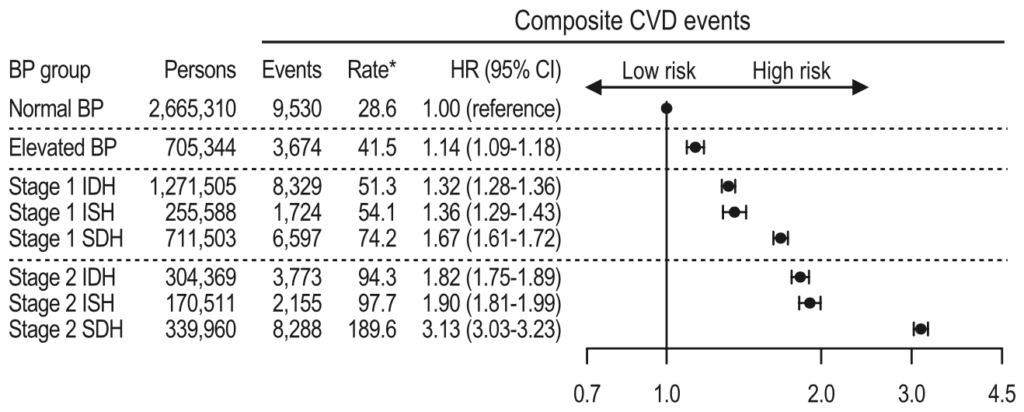Get new posts by email or rss feed
Summary
I’m trying to identify causes and ways of reducing my elevated blood pressure and am looking for feedback on my experimental design & protocols.
Studies/Experiments:
- Phase 1: Identify Potential Causes of Elevated Blood Pressure from Existing Self-Tracking Data
- Approach (details below)
- Use a mixed-effect model to look for look for significant correlations in data I’ve already collected.
- If I find anything promising, design additional studies to confirm the relationship and test interventions.
- Metrics to look at
- blood glucose, sleep, exercise, weight/body, pulse, HRV
- Approach (details below)
- Phase 2: Testing Deep Breathing to Lower Blood Pressure
- Approach (details below)
- Measure blood pressure and pulse before & after the most well studied protocols as well as normal breathing.
- If any protocols show significant reduction in blood pressure, optimize the protocol and design/execute an experiment to test the long term effect.
- Analysis
- Student’s t-test will be used to test if the blood pressure change for any of the protocols is different from that of normal breathing.
- Approach (details below)
Questions:
- Phase 1
- Any other metrics I should be looking at?
- Does this analytical approach seem reasonable? Are there different statistical approaches I should be taking (details below)?
- Phase 2
- Has anyone tried this? If so, what breathing protocols have worked for you?
- Any suggestions for other interventions to try?
- Any comments or critiques of the experimental design or analysis?
- Anything else I should be measuring while doing this?
It would significantly improve these studies to have a larger number of participants. If you’re interested in collaborating on this or other scientifically rigorous self-experiments with blood pressure, low-carb foods, supplements, or other health interventions, please let me know in the comments or via the contact form on the right.
Details
Purpose
- To identify environmental or controllable factors that have a significant impact on my blood pressure.
- To quantify the effect of known interventions for reducing blood pressure.
- To find a set of interventions that enable me to reduce my blood pressure below 120/80 mmHg.
Background

I’ve been measuring my blood pressure over the past 4 months and it’s consistently over the American Heart Association target of 120/80 mmHg for “Normal” blood pressure. Of more concern, I frequently measure Systolic blood pressure of >130 mmHg, which is considered Stage 1 Hypertension.


Given this, I’d like to see if I can reduce my blood pressure and reduce the strain on my heart and circulatory system.
There are numerous medications that lower blood pressure, but all risk of side effects. Before I pursue that route, I’d like to better understand the cause of my elevated blood pressure and see if any diet or lifestyle interventions can ameliorate it.
As mentioned above, I’ve been measuring my blood pressure for the past 4 months, along with blood glucose, sleep, weight, and exercise. This provides a (hopefully) rich dataset for identifying environmental or lifestyle factors that influence my blood pressure. Notably, I’ve noticed that my blood pressure is elevated on days after I’ve had low blood sugar the night before, indicating a possible effect (no statistical analysis done).
From an American Hearth Association evaluation of methods non-medication approaches to reduce blood pressure, with the exception of aerobic exercise (which I already do), the most well evidenced methods of reducing blood pressure are meditation and deep breathing.
Proposed Experiments
Phase 1: Identify Potential Causes of Elevated Blood Pressure from Existing Self-Tracking Data
- Data
- Blood pressure:
- systolic and diastolic blood pressure
- Measured by Omron Evolve
- Glucose:
- Same day: fasting BG
- Previous day: average BG, time low (70, 60, & 50), time high (120, 140, 160), & coefficient of variation
- Previous evening (after 7p): same as previous day
- Measured by Dexcom G6
- Sleep:
- Time asleep, number of wake-ups, early rising (time woke before alarm)
- Measured manually and by Apple Watch (less reliable but more data)
- Other heart markers:
- pulse (sleeping, morning, and awake), heart rate variability
- Measured by Apple Watch and Omron Evolve
- Body:
- Weight & waist circumfrence
- Measured by scale + Renpho tape measure
- Exercise:
- Type of exercise the previous day (aerobic vs. strength training) and frequency of aerobic exercise
- Manually recorded
- Blood pressure:
- Analysis
- A mixed effect model will be used to calculate the effect size, standard error, and p-value for the correlation between each metric and systolic and diastolic blood pressure
- Effects will be of significant magnitude if a reduction of 5 mmHg can be achieved via a practical variation in the correlating metric.
- Given the large number of metrics being looked at, I will use p-value thresholds of:
- 0.02 for planning testing interventions
- 0.05 for follow up experiments to confirm the correlation
- 0.1 for further monitoring/assessment as I get more data
- Questions
- Any other metrics I should be looking at?
- Does this analysis seem reasonable? Are there different statistical approaches I should be taking?
Phase 2: Testing Deep Breathing to Lower Blood Pressure
- Background
- Numerous studies, reviews, and meta-analyses have shown deep breathing to lower blood pressure in both the short and long-term (example 1, example 2).
- Effect sizes are moderate (3-5 mmHg) and statistically significant for large patient populations (>10,000 patients in some studies).
- Numerous breathing protocols have been tested, with varying results.
- Approach
- Measure blood pressure and pulse before & after the most well studied protocols as well as normal breathing.
- For each protocol, measure at least three times. If the protocol shows a reduction in blood pressure, measure an additional 5 times to confirm.
- Conduct measurements 1/day in the mornings.
- If any protocols show significant reduction in blood pressure, optimize the protocol and design/execute an experiment to test the long term effect.
- Measurement
- Blood pressure and pulse will be measured with an Omron Evolve.
- Analysis
- Student’s t-test will be used to test if the blood pressure change for any of the protocols is different from that of normal breathing.
- Questions
- Has anyone tried this? If so, what breathing protocols have worked for you?
- Any suggestions for other interventions to try?
- Any comments or critiques of the experimental design or analysis?
- Anything else I should be measuring while doing this?
Thanks in advance for your comments & feedback!
– QD